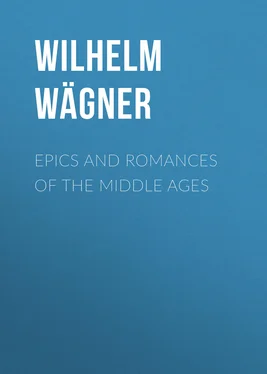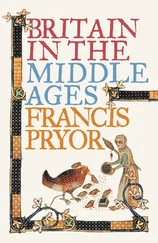Wilhelm Wägner - Epics and Romances of the Middle Ages
Здесь есть возможность читать онлайн «Wilhelm Wägner - Epics and Romances of the Middle Ages» — ознакомительный отрывок электронной книги совершенно бесплатно, а после прочтения отрывка купить полную версию. В некоторых случаях можно слушать аудио, скачать через торрент в формате fb2 и присутствует краткое содержание. Жанр: foreign_poetry, literature_19, Мифы. Легенды. Эпос, Поэзия, foreign_antique, foreign_prose, на английском языке. Описание произведения, (предисловие) а так же отзывы посетителей доступны на портале библиотеки ЛибКат.
- Название:Epics and Romances of the Middle Ages
- Автор:
- Жанр:
- Год:неизвестен
- ISBN:нет данных
- Рейтинг книги:4 / 5. Голосов: 1
-
Избранное:Добавить в избранное
- Отзывы:
-
Ваша оценка:
- 80
- 1
- 2
- 3
- 4
- 5
Epics and Romances of the Middle Ages: краткое содержание, описание и аннотация
Предлагаем к чтению аннотацию, описание, краткое содержание или предисловие (зависит от того, что написал сам автор книги «Epics and Romances of the Middle Ages»). Если вы не нашли необходимую информацию о книге — напишите в комментариях, мы постараемся отыскать её.
Epics and Romances of the Middle Ages — читать онлайн ознакомительный отрывок
Ниже представлен текст книги, разбитый по страницам. Система сохранения места последней прочитанной страницы, позволяет с удобством читать онлайн бесплатно книгу «Epics and Romances of the Middle Ages», без необходимости каждый раз заново искать на чём Вы остановились. Поставьте закладку, и сможете в любой момент перейти на страницу, на которой закончили чтение.
Интервал:
Закладка:
“Thanks, noble hero,” said Liebgart, “and may Heaven protect you on your quest! But—the monster will take your life as it did my husband’s. Nay, go your way in peace, and leave me to my fate.”
But when the Greek showed her that his mind was firm, Liebgart gave him a ring which the dwarf had told her would bring good luck to the wearer, wished him all success, and then returned to Castle Garden.
Without more delay the hero turned his horse to the mountains, and made the best of his way to the lind-worm’s hole, which at length he reached. He peeped into the dark cavern, and saw five dragons’ heads staring and hissing at him. These were the young “worms”—the old one had gone out to seek for food. The hero was about to slay them there and then, but it suddenly occurred to him that it would be better if the old worm knew nothing of his coming, and it would be an easy task to kill the little ones when the mother was dead. So remounting his horse, he set out in search of the monster. As he rode on slowly, he saw a beautiful child standing on a rock. It called to him,—
“You are come to revenge my son Ortnit; beware that you sleep not, for if you sleep my son will remain unrevenged, and you will fall a prey to the dragon.”
“My good friend,” laughed the hero, “you are too young to be a father. I advise you to look out for yourself. You would be a sweeter morsel for the monster than I!”
And setting spurs to his horse, he rode away laughing. Like Ortnit, he came first to the high cliffs, and then to the meadow, where clover grass and flowers grew in wonderful profusion. A linden-tree shaded part of it from the heat of the mid-day sun. The hero was tired after his long journey and wakeful night. He stretched himself in the shade to rest, while his horse grazed in the meadow. Fatigue, the fresh sweet air, and the song of the birds in the branches overhead, all combined to make him drowsy, so he gradually fell asleep.
Perfect peace reigned in the quiet spot. It seemed as though it might last for ever, but suddenly it was broken by a horrible hissing, a crashing of rocks and breaking of trees. The dreadful monster, the terror of the land, was drawing near. At the same moment Alberich exclaimed:
“Wake, noble hero; sleep no more; the lind-worm is upon you.”
The dwarf repeated his warning several times in vain. The faithful horse galloped up to his master, and kicked him, but he did not awake. It was not until the dragon gave utterance to a loud and hideous roar, that made the rocks crack and the mountains tremble, that the hero was at last aroused from his trance. He sprang to his feet and attacked the monster; but his weapons were all too weak for the work they had to do—they broke like reeds on the creature’s hide, without doing it any injury. So he flung the handle of his broken sword in the monster’s face, and commended his soul to God, for he was defenceless. The worm caught him up in the coils of its long tail, and at the same moment seized the horse in its great jaws. Then it bore its victims away to its den, and threw them down as food for its young. After which, it went away again in search of more food. The little dragons tried to devour Wolfdieterich, but could not, he was so well protected by his shirt of palm-silk, so they thrust him aside unconscious, and turned their attention to the horse, which they soon disposed of.
In the middle of the night Wolfdieterich came to himself, and began to look about him carefully. The moonlight penetrated the cavern, and showed him at a little distance something that shone bright red. He moved towards it cautiously for fear of waking the dragons, and found that the object which had attracted his eye was a huge carbuncle in a sword-hilt. He at once knew that this must be the sword Rosen, and took possession of it, as well as of the rest of Ortnit’s armour that he found lying uninjured amongst other coats of mail, which however were all more or less broken. With the armour he found a ring. This he put upon his finger. His preparations were no sooner completed than daybreak came, and with it the old lind-worm. He at once attacked her, and, thanks to the magic sword, slew her and all her brood after a hard struggle. Thoroughly exhausted, he threw himself under a tree, where he lay panting and breathless. There Alberich found him, and revived him with food and wine.
Before the victorious hero set out on his return to Garden, he went back into the dragon’s den to get the heads of the monsters; but when he had cut them off, he found that they were much too heavy to carry, so he contented himself with taking their tongues. These he put in a leather bag that one of Alberich’s dwarfs brought him for the purpose, and then began his journey, which was made longer and more wearisome by having to be done on foot. He often lost his way amongst the wild mountains, and did not reach his destination for many days.
When he got to Garden, he found the castle full of feasting and mirth. Wondering much, he went to a pious hermit who lived near, and asked him the meaning of what was going on. From him he learnt that the Burgrave Gerhart had slain the lind-worm, and was to be married to beautiful Liebgart that very evening. Wolfdieterich then begged the holy man to lend him priestly garments, and having received those that had formerly belonged to brother Martin, the hermit’s predecessor, he put them on over the armour he had found in the dragon’s cave, and repaired to the castle.
He entered the great hall, and saw Burgrave Gerhart, nicknamed “Hawk’s Nose,” seated next to the pale queen, who, with her maidens, filled the glasses of the guests. Above the Burgrave’s chair were the dragons’ heads, symbols of his victory. When the queen saw the pretended hermit, she took him a cup of wine, which he emptied at a draught, and then gave back, after having slipped into it the ring she had given him on the evening he started on his quest. Liebgart did not notice the ring till she had returned to her seat by Gerhart’s side. Then she trembled violently, but forcing down her emotion, she desired the hermit to approach, and tell her from whom he got the ring.
“Lady, you gave it me yourself,” he said, throwing aside his disguise.
Every eye was fixed on him as he stood in the middle of the hall, clad in Ortnit’s wondrous armour, and looking more like a god than a mortal man. When, advancing to the queen, he laid her husband’s ring in her hand, and told her how and where he had found it, many voices cried, “Hail to the avenger of our king, the slayer of the dragon and its brood! Hail to the new king of Lombardy!”
Burgrave Gerhart was not to be put aside so easily. He pointed to the dragons’ heads as proofs of his right; but when Wolfdieterich produced the tongues from his wallet, there was no more to be said but for Burgrave Gerhart to beg the hero’s pardon. This he received on condition of swearing fealty.
Wolfdieterich was now proclaimed king of Lombardy, and was told that he was expected to marry the queen.
“My lords,” he said, “as ruler of this kingdom, I am also the servant of my people, and am bound to labour for their welfare. But as regards personal matters, such as the choice of a wife, I must be free, and the queen must also be free to choose as she lists. She is yet mourning the loss of her first husband. But if she holds me worthy to succeed him, and thinks that my love and reverence will comfort her for his loss, I offer her my hand for life.”
Liebgart, remembering what Ortnit had said to her, placed her hand in the hero’s, and was married to him before long.
Wolfdieterich was no longer the impetuous boy who had left Lilienporte, but a man who could act with wisdom, prudence and forethought. He felt that his first duty was to restore peace and quiet to Lombardy, and that only after that was done would he be at liberty to consult his own wishes, and start to the assistance of his faithful servants. A year was spent in this labour, and then he told his wife that he must go to Lilienporte. She wept and said that she feared lest, like Ortnit, he should never return, but in the same breath confessed that he was right, and helped him to make ready for his journey and that of his army, which was to number sixty thousand men.
Читать дальшеИнтервал:
Закладка:
Похожие книги на «Epics and Romances of the Middle Ages»
Представляем Вашему вниманию похожие книги на «Epics and Romances of the Middle Ages» списком для выбора. Мы отобрали схожую по названию и смыслу литературу в надежде предоставить читателям больше вариантов отыскать новые, интересные, ещё непрочитанные произведения.
Обсуждение, отзывы о книге «Epics and Romances of the Middle Ages» и просто собственные мнения читателей. Оставьте ваши комментарии, напишите, что Вы думаете о произведении, его смысле или главных героях. Укажите что конкретно понравилось, а что нет, и почему Вы так считаете.










